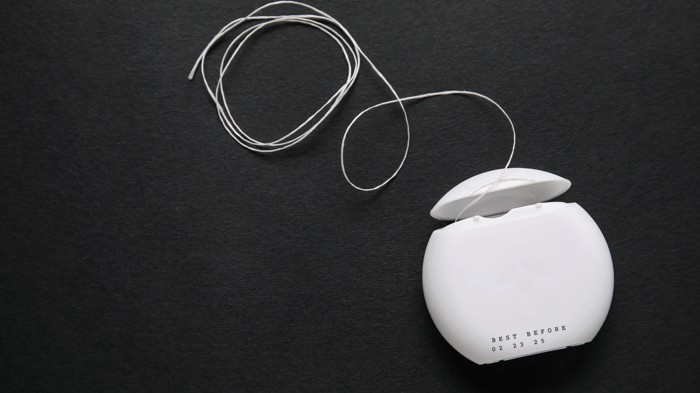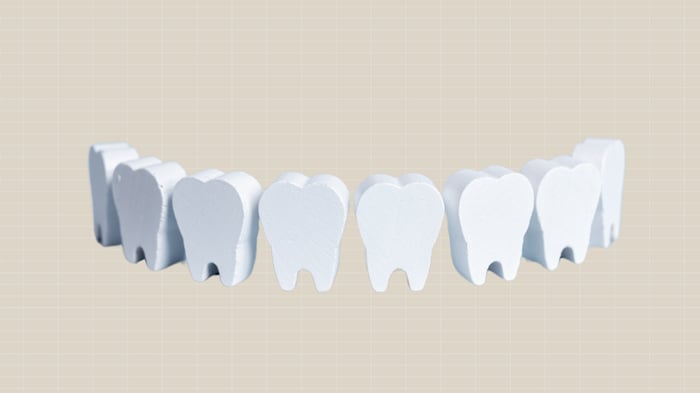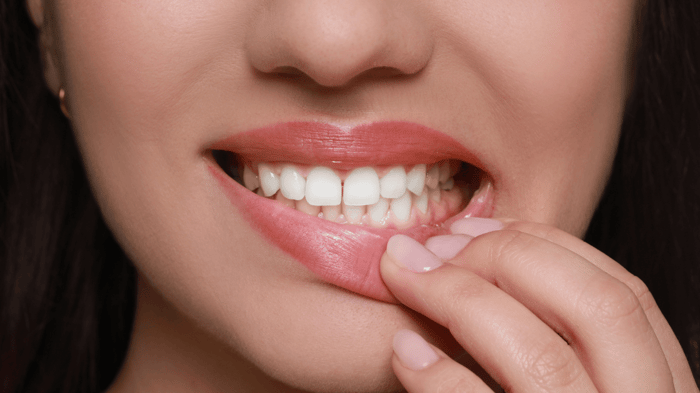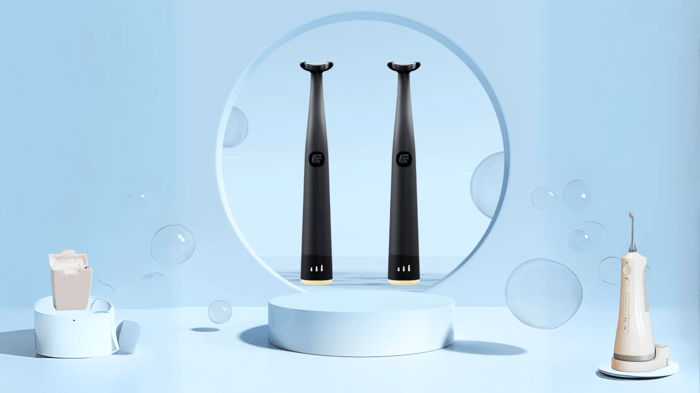Have you ever smelled your floss after using it? We know… it’s gross (if you haven’t done this - try it next time you floss). Beyond the discomfort and embarrassment of bad breath, this odor can sometimes signal underlying health issues. In this blog post, we will unravel the causes of bad breath when you floss and serve up effective solutions to help you say farewell to foul fumes. Walk together with us on the path to maintaining a fresh breath, a healthier mouth, and ultimately, skyrocketing your confidence. Buckle up as we do our best Nancy Drew impersonation and dive into solving the floss stink mystery!
The presence of a foul odor when flossing can be a multitude of factors. The causes of bad breath when you floss can include an indication of bacterial buildup or food particles trapped between your teeth and gums. This can be caused by a number of factors, some of which include poor oral hygiene, gum disease, or certain medical conditions. It is advised to visit a dentist for a thorough examination and professional advice on how to improve your oral hygiene routine and address any underlying issues.

Unveiling the Stink: Why Flossing Can Smell Bad
Have you ever noticed an unpleasant odor when flossing your teeth? Have you ever wondered about the causes of bad breath when you floss? If so, you're not alone. The peculiar smell that can arise during flossing is quite common and has a logical explanation. When we floss our teeth, we are not only removing food particles but also disrupting the bacterial ecosystem within our mouths. This disturbance can release compounds known as volatile sulfur compounds (VSCs) that give off an unpleasant odor.
It's important to understand that this odor is not necessarily an indication of poor oral hygiene. Even individuals who meticulously brush and floss daily may still experience this smell. Rest assured that it's usually a temporary issue that can be mitigated with proper dental care.
-
According to a study published in the Journal of Clinical Periodontology, approximately 80% of individuals with noticeable bad breath (oral halitosis) have an oral condition that contributes significantly to the problem - such as gum disease.
-
A survey by American Academy of Periodontology found that nearly a third of people say they floss less than daily, leading to accumulation of bacterial plaque and consequently, foul smells.
-
Dental research suggests that up to 40% of American adults suffer from mild to severe periodontal disease which can accumulate foul-smelling bacteria if not properly cleaned daily with techniques like flossing.
Behind Bad Breath: The Role of Bacterial Plaque
To comprehend the root cause of bad breath post-flossing, we need to delve into the world of bacterial plaque. Plaque is a sticky film composed of bacteria and residue that forms on our teeth throughout the day. When plaque accumulates in hard-to-reach areas between our teeth and along the gum line, it provides an ideal breeding ground for bacteria.
As these bacteria break down leftover food particles and other debris, they release sulfur compounds as byproducts. These volatile sulfur compounds are responsible for the foul odor associated with bad breath. Furthermore, if the plaque buildup is not adequately addressed, it can lead to more severe oral health issues such as gum disease.
Imagine a neglected garden overrun with weeds and fungi due to lack of maintenance. Similarly, when bacteria within plaque multiply and feed on remnants of food, they produce waste products that emit an unpleasant smell, just like an unkempt garden emits foul odors.
Therefore, maintaining good oral hygiene practices like regular brushing and especially flossing becomes crucial in preventing the buildup of bacterial plaque and controlling bad breath. By flossing effectively and reaching below the gum line where bacteria can collect, you can disrupt the ecosystem that leads to foul odor and ensure a fresher breath.
Now that we understand the relationship between flossing and bad breath, let's explore some medical concerns that may contribute to the foul smell experienced after flossing.
-
The main takeaway from this information is that bad breath post-flossing is often caused by the accumulation of bacterial plaque between the teeth and along the gum line. This plaque provides a breeding ground for bacteria, which produce sulfur compounds that result in foul odor. It is important to maintain good oral hygiene practices, including regular brushing and flossing, to prevent plaque buildup and control bad breath. Additionally, addressing any medical concerns that may contribute to the smell is recommended.
Medical Concerns Involving Foul Breath Post-Flossing
Flossing is an essential aspect of maintaining good oral hygiene, but it can be disheartening when you're left with lingering bad breath afterward. Sometimes, foul breath post-flossing can indicate certain medical concerns that deserve attention. By understanding these concerns, you can take proactive measures to address and prevent them.
One common cause of bad breath after flossing is gum disease. This condition occurs when bacteria build up in the mouth, leading to inflammation and potential damage to the gums. The distinctive odor that accompanies gum disease is often noticeable while flossing due to the removal of debris and bacteria. If you frequently experience bad breath during or after flossing, it might be time to evaluate your oral health further with a dental professional.
Spotting Gum Disease and Other Oral Conditions from Floss Odor
When you floss, pay attention to any unpleasant smell that emanates from the floss itself or your mouth. It's crucial to recognize that a persistent and foul odor may indicate an underlying issue that needs addressing.
By smelling the floss after use, you can gain insights into potential problems below the gum line. Dental floss that carries an unpleasant smell could signal the presence of bacteria and leftover food particles trapped in those hard-to-reach areas around your gums. These pockets, known as sulcus, are prime spots for bacterial accumulation and can lead to gum disease if not properly addressed.
Picture this: You diligently floss your teeth one evening and notice an unpleasant odor on the floss as you glide it between your teeth. You're left wondering about the causes of bad breath when you floss and you want to find out more! This smell may serve as a warning sign of gum disease or other oral conditions, prompting you to seek professional advice or adapt your oral care routine accordingly.
Preventing Smelly Floss: Dental Hygiene Tips
No one wants their flossing routine to leave behind a less-than-pleasant odor. The good news is that there are dental hygiene tips you can follow to prevent smelly floss and keep your breath fresh.
Maintaining good oral hygiene is crucial for avoiding the buildup of bacteria and leftover food particles that can lead to bad breath. One key factor is brushing your teeth thoroughly at least twice a day using fluoride toothpaste. This helps remove plaque and bacteria from the surface of your teeth and gums. Don't forget to brush your tongue as well, as it can harbor odor-causing bacteria.
In addition to brushing, flossing plays a vital role in eliminating hidden debris between teeth and along the gum line. It's important to floss well below the gum line to reach the sulcus, a little pocket where bacteria can accumulate. Smelling dental floss after use can actually help determine if you have gum disease. If the floss smells bad, it indicates the presence of bacteria and leftovers below the gum line.
To prevent smelly floss, ensure that you floss daily with proper technique and take a few extra steps beyond traditional brushing and flossing.
Effective Flossing Techniques and Solutions
Now that we understand the causes of bad breath when you floss and the importance of proper oral hygiene, let's explore some effective flossing techniques and solutions that can help tackle those odor-causing substances hiding between our teeth.
One technique to enhance your flossing routine is to choose the right type of floss for your needs. There are different varieties available such as waxed or unwaxed, flavored or unflavored, and even options designed specifically for sensitive gums. Experiment with different types until you find one that suits your preferences.
Next, ensure that you are using the correct flossing technique. Ensure that when you are flossing, you are forming a 'C' shape around the tooth to reach below the gum line. Be careful not to snap or force the floss, as this can cause damage to your gums.
If you struggle with traditional flossing techniques or find it challenging to reach certain areas, there are alternative options available. One such option is an interdental brush, which is designed with small bristles that can effectively clean between teeth. Water flossers or oral irrigators are also popular choices as they use a directed stream of water to remove plaque and debris from hard-to-reach areas. Electric flossers, like Flaus, are also a good alternative option to traditional floss.
Remember, consistency is key when it comes to maintaining good dental hygiene and getting rid of those annoying elements that cause bad breath when you floss. Make it a habit to floss at least once a day, preferably before bedtime, to ensure you are effectively removing any food particles and plaque that could lead to bad breath.
Now that we've explored preventive measures and effective flossing techniques, let's dive into a dental equipment solution that can further enhance your oral hygiene routine.
Dental Equipment that Can Help and Change the Way we Floss: Enter, the Electric Flosser
Flossing has long been an integral part of maintaining optimal oral health. However, traditional flossing techniques can be challenging for some individuals and may not always provide desired results. Traditional flossing can be time consuming, gross and you have to stick your fingers in your mouth. Studies have shown that over 30% of Americans never floss at all and 70% don’t floss. Thankfully, a new approach to oral care is gaining traction and transforming the way we floss.
If you’re looking to amp up your flossing game and want a tool that will help you become a daily flosser, you could consider an electric flosser, like Flaus.
Flaus uses real dental floss and sonic vibrations that provide a floss-assist motion that helps dislodge plaque and debris, all while stimulating your gum line. Electric flossers, like Flaus, allow you to floss up to 5x faster and the vibrations help to get floss between tight teeth, as well as provide a massage for your gums (to keep them happy and healthy)!
Electric flossers make flossing less time consuming, while still allowing for proper floss techniques. If putting your fingers in your mouth was a deterrent to flossing, Flaus has an ergonomic handle that allows you to get to those hard-to-reach molars easier than traditional floss.
By embracing this new approach to flossing, you can enhance your oral care routine and effectively combat bad breath. These advancements in dental technology bring convenience, efficiency, and improved results to the table, making it easier than ever to achieve a healthier, fresher smile.
Please note that it is advised to always consult a dental professional if you have any concerns with your oral health.


















